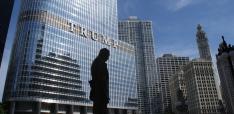Bull in a China Shop

The combination of Covid-19 and the forthcoming US election is driving Sino-US relations to the point where a new ‘Cold War’ could be a best case scenario.
“The relationship between China and the United States is going to be very uneven going forward. It will be antagonistic at one level, but also seeking great cooperation on…the economic front, because so many American farmers depend on China (to buy) what they produce.
Gary Locke, US Ambassador to China 2011-2014 (quoted on the BBC News website, 1 May 2020)
It’s still the economy…
“[Mr] Trump, whose reelection bid was built on a strong economy before it was derailed by the epidemic, is losing patience with the economic blackout and has challenged governors who are preaching caution, setting the stage for larger clashes over the pace of the reopening.”
Jarrett Renshaw, Reuters, 16 April 2020
On the first Tuesday of May and exactly six months to the day before the general election, US President Donald Trump effectively relaunched his reelection campaign which had been largely on ice for the previous four weeks-plus thanks to Covid-19. His — and Vice-President Mike Pence’s — public statements that day were summed up by the BBC’s Anthony Zurcher as follows:
“The White House's shift in focus from the public health aspect of the coronavirus pandemic to its economic impact continues…. Now, it appears, the officials setting the agenda will be ones more concerned with jobs, businesses and the fiscal health of the nation — even though the number of cases of the virus throughout the US continues to increase.”
Pre-Covid-19, it had long been clear that the main cornerstone of Mr Trump’s 2020 election campaign would be his stewardship of the US economy. And, even though the prevailing circumstances have forced some changes in the thinking on the part of his campaign team, Mr Trump’s determination to get America back to work as soon as he can underlines the fact that it remains an important element. However, as Ebony Bowden wrote in the 30 April edition of the New York Post:
“Low unemployment and a roaring financial market had been the bedrock of [Mr] Trump’s campaign, but with unemployment claims reaching 30 million in the past month, the campaign will begin focusing on the tax cuts, deregulation and job creation the president ushered in before the crisis…. The campaign will play to the president’s strengths, including his stance on strong borders, domestic manufacturing and the need to exit trade deals — all issues which have been highlighted by the coronavirus crisis.”
The same article goes on to quote a ‘campaign source’ as follows:
“The economy was part of a larger message of promises made and promises kept. The only person that can bring America back to the greatness we saw under the first part of the Trump administration is President Trump.”
In other words, a core message may have shifted from Mr Trump’s track record alone to one of track record plus his being the best person to drive renewal; but it remains the case that, in significant part, “it’s the economy, stupid”.
It follows that Mr Trump is hardly likely deliberately to take actions which would inflict further damage on the US economy. Thus, the same logic applies today as was the case in December/January when the US President backed off from imposing further tariffs on imports from China (which would have hit both the US economy and consumers hard) in favour of a weak (especially from Washington’s perspective) trade deal which was pretty much the same as one which was on the table in March/April 2018.(1) Which is to say that, for all his determination to distract from his own Administration’s failings by pointing the finger of blame firmly at Beijing for the Covid-19 epidemic, Mr Trump was probably not about to re-escalate trade-related tensions even before the US equity market fired a warning shot across his bows on 1 May after he threatened to pull out of January’s so called ‘phase one’ deal.
If not trade, then what?
“Launching a full-scale economic war would roil relations across the board…. The [Chinese] regime could not help but battle back and do so in any forum available. While economic conflict does not guarantee military confrontation, the disintegration of commercial cooperation and contact that once provided the glue in the relationship between very different systems would yield an incendiary environment. Moreover, Washington would put almost every country on Earth in the middle of a collision between the two most important—and by some measures, at least, most powerful—nations. This would transmit great-power conflict around the globe. Every government would have to decide who to support and who to defy. The United States might be surprised at some decisions….”
Doug Bandow, Foreign Policy, 5 May 2020
If all this sounds like relatively good news, it may not be.
For starters, we may need to revisit and revise this assessment if China is especially tardy following through on its commitments under the phase one deal on imports from the US even though this could be, in part at least, a direct result of the economic slowdown there.(2) Nevertheless, for the time being at least, I think we should be looking primarily for escalating tensions outside the sphere of trade in goods.(3)
Not that any of the other economic options are any more attractive. Indeed, as Doug Bandow spells out the essay from which the quote above is taken, there appear to be no economic options which do not come with a cost — in some cases potentially substantial — to the United States itself. Despite the heat of the debate in Washington — further fuelled, of course, by the proximity of the general election — one can therefore reasonably hope that more sober voices, combined with Mr Trump’s survival instincts, will prevail even if, as the BBC’s Barbara Plett Usher recently opined (accurately, in my view):
“As the election approaches Mr Trump has signalled that he will listen more to the hawks than the doves in his coterie of conflicted advisors. And he'll be cheered on by a number of Republican lawmakers….”
But this is not going to stop the barrage of inflamed rhetoric which is emanating from the US and which is being matched pretty much blow for verbal blow by Beijing, creating a vicious downward spiral (which, worse still, all too often deviates — by design — from the known facts).
Cold War or worse?
“Future historians might record that the Covid-19 pandemic marked the start of a new cold war between China and the US.”
Gideon Rachman, Financial Times, 4 May 2020
Furthermore, we can be sure that, for its own domestic reasons, Beijing is no more likely to back off than the US is despite the anger which its aggressive defence of its handling of Covid-19 is causing in a whole range of countries (more even than I anticipated in my 7 April article) and the extent to which this runs counter to its international aspirations.
In such circumstances, talk of a new ‘Cold War’ no longer seems to be particularly hyperbolic. Indeed, I don’t think it unduly alarmist that, having begun a recent article with reference to such (see above), the FT’s Gideon Rachman goes on to conclude as follows:
“At worst, all these angry emotions on both sides will lead not just to a cold war, but to a hot one: a real, armed conflict”.
Indeed, I agree.
If Washington cannot find an acceptable way to ‘punish’ Beijing economically, there is a real risk that it will look to other, even more risky, options. One obvious one would be to push back even harder against Chinese actions in the South China Sea, and against military activities aimed at Taiwan and at the disputed (with Japan) Senkaku Islands. Already, US Secretary of State Michael Pompeo has openly accused China of looking to take advantage of neighbouring states’ preoccupation with the Covid-19 pandemic to pursue its regional agenda; and US military activity in the region is reportedly on the increase.
If, as many analysts believe, Chinese actions could encourage the ASEAN littoral states in particular to close ranks against Beijing and/or align more closely with the Washington, it would, in my view, serve to make China even more aggressive, thereby increasing still further the risk of a potentially serious miscalculation….by both sides.
Alastair Newton is a member of Global Policy's Practitioners' Board and an alumnus of the LSE. He is also a professional political analyst who was based in the City of London from 2005 to 2015.
Photo by Hoang Loc from Pexels
Notes
[1] The deal removed the threat of tariffs on around USD155bn worth of imports (largely consumer products) to the US from China and halved (to 7.5%) existing tariffs on a further USD120bn of goods. It left in place 25% tariffs on around USD250bn of goods.
[2] The Chinese committed to buy at least an extra USD200bn of US goods and services relative to their 2017 purchases, over two years, including around USD40bn of farm products (a particularly important sector for Mr Trump’s electoral base).
[3] For the purposes of this paper I am deliberately ignoring any action which is not initiated by the federal government, eg private sector and individual state legal actions seeking compensation from China. However, no matter how small the probability of any of these actually achieving their objective, they cannot be lightly dismissed as they certainly add to Sino-US tensions.


